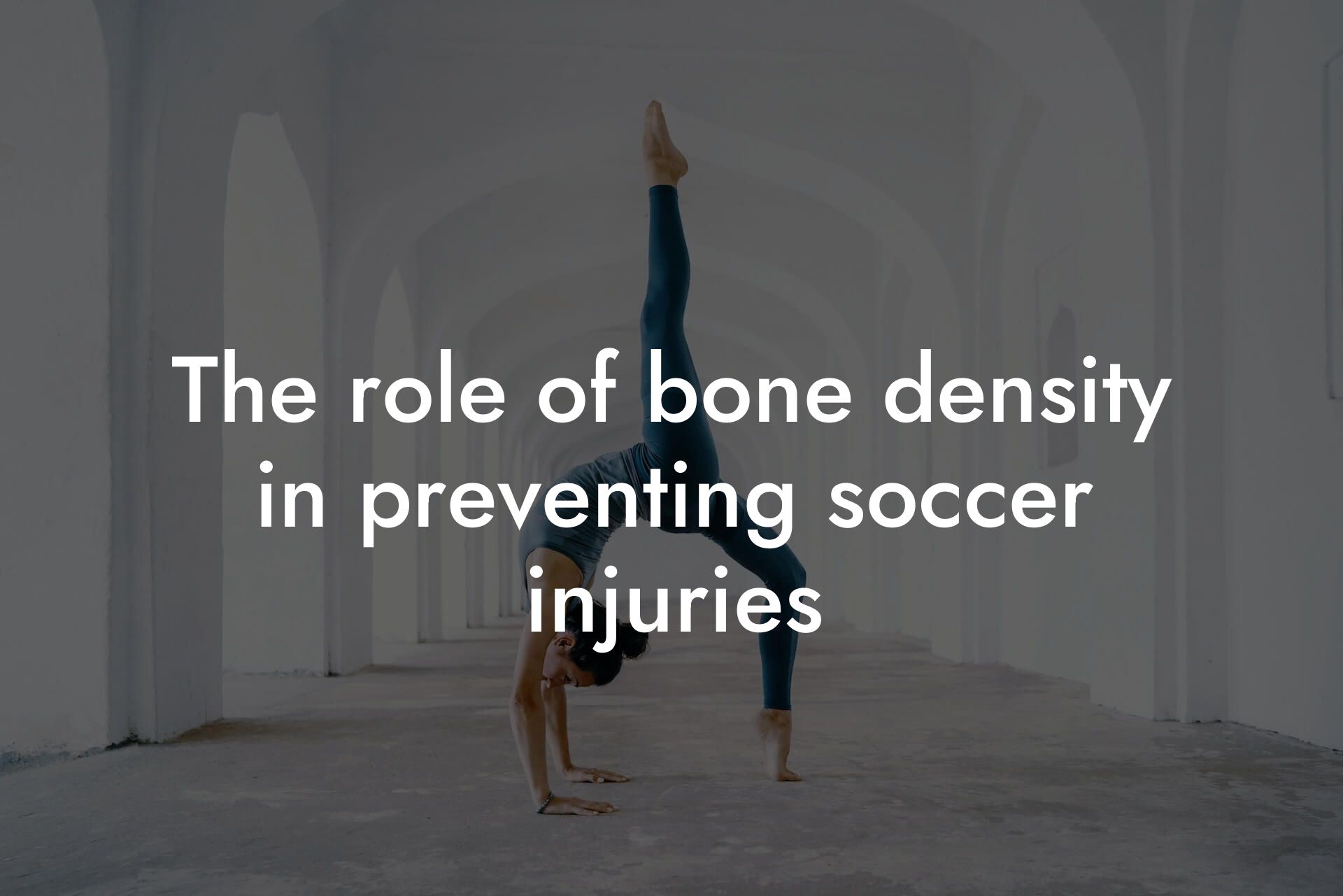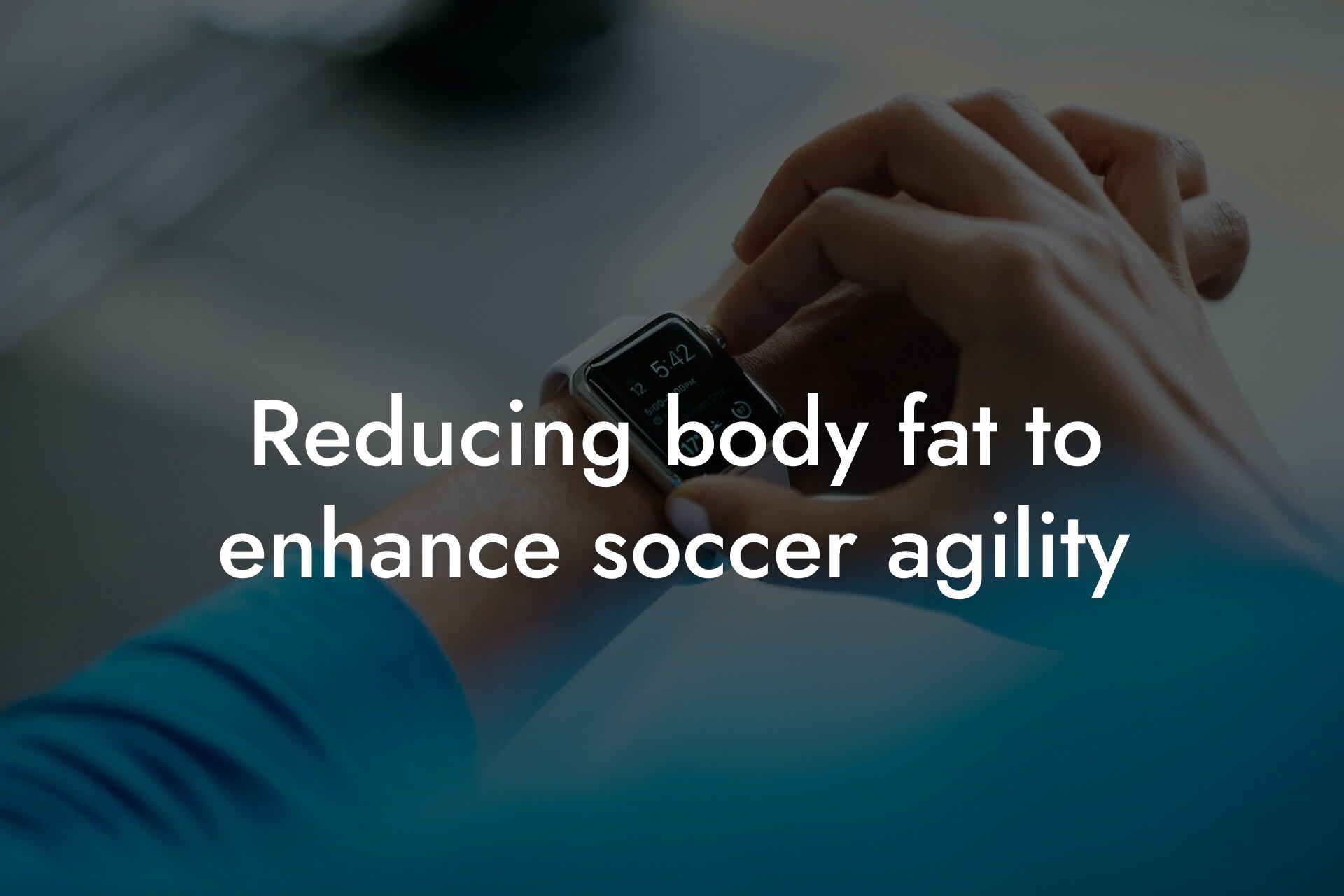As a soccer player, the off-season is a critical period to focus on improving your physical fitness, technical skills, and overall performance. A well-structured off-season training program can help you return to the pitch stronger, faster, and more prepared than ever before. In this article, we'll delve into the essential training strategies and techniques to help you dominate the competition.
Table of Contents
- Setting Goals and Assessing Your Current Fitness Level
- Periodization: A Key to Successful Off-Season Training
- Building a Foundation of Strength and Endurance
- Power and Speed Development
- Sport-Specific Training and Simulation
- Incorporating Flexibility and Mobility Exercises
- Nutrition and Recovery Strategies
- Mental Preparation and Visualization Techniques
- Frequently Asked Questions
Setting Goals and Assessing Your Current Fitness Level
Before diving into your off-season training program, it's crucial to set specific, measurable, and achievable goals. Identify areas you need to improve, such as increasing your speed, enhancing your endurance, or boosting your strength. A comprehensive body assessment, like the one provided by Tano Performance Group's DEXA machine, can help you understand your current fitness level, body composition, and bone density. This valuable information will enable you to create a tailored training program that addresses your unique needs and goals.
Periodization: A Key to Successful Off-Season Training
Periodization is a training methodology that involves dividing your off-season into specific phases, each with a unique focus and intensity. This approach allows you to avoid plateaus, reduce the risk of injury, and ensure progressive overload. A typical off-season periodization plan for soccer players includes:
- Phase 1: Active recovery and regeneration (2-4 weeks)
- Phase 2: Building a foundation of strength and endurance (4-6 weeks)
- Phase 3: Power and speed development (4-6 weeks)
- Phase 4: Sport-specific training and simulation (4-6 weeks)
Building a Foundation of Strength and Endurance
During Phase 2, focus on building a solid foundation of strength and endurance through a combination of resistance training and cardiovascular exercises. This phase should include:
- Resistance training: Focus on exercises that target your core, legs, and glutes, such as squats, deadlifts, and lunges. Aim for 2-3 sessions per week, with 3-4 sets of 8-12 reps.
- Cardiovascular training: Incorporate low-to-moderate intensity aerobic exercises, such as jogging, cycling, or swimming, for 20-30 minutes, 2-3 times a week.
Power and Speed Development
In Phase 3, shift your focus to developing explosive power and speed. This phase should include:
- Plyometric exercises: Incorporate jump squats, box jumps, and resisted sprints to improve your power output. Aim for 2-3 sessions per week, with 3-4 sets of 6-10 reps.
- Speed training: Incorporate short, high-intensity sprints (20-50 meters) with active recoveries. Aim for 2-3 sessions per week, with 3-4 sets of 6-10 reps.
Sport-Specific Training and Simulation
In Phase 4, focus on sport-specific training and simulation to prepare yourself for the demands of the game. This phase should include:
- Small-sided games: Participate in 3v3 or 4v4 games to improve your decision-making, ball control, and movement.
- Agility drills: Incorporate drills that mimic the movements and changes of direction required in soccer, such as cone drills and shuttle runs.
Incorporating Flexibility and Mobility Exercises
In addition to strength, power, and endurance training, it's essential to incorporate flexibility and mobility exercises to improve your range of motion and reduce the risk of injury. Focus on exercises that target your hips, knees, and ankles, such as:
- Leg swings and lunges
- Calf raises and ankle mobilization
- Hip circles and leg raises
Nutrition and Recovery Strategies
A well-structured training program is only half the battle. Adequate nutrition and recovery strategies are crucial to support your training and optimize your performance. Focus on:
- A balanced diet that includes lean protein, complex carbohydrates, and healthy fats
- Proper hydration and electrolyte replenishment
- Adequate sleep and rest (7-9 hours per night)
- Active recovery techniques, such as foam rolling, stretching, and self-myofascial release
Mental Preparation and Visualization Techniques
Mental preparation and visualization techniques can help you develop a winning mindset and perform at your best on the pitch. Focus on:
- Positive self-talk and affirmations
- Visualization exercises to rehearse game scenarios and develop confidence
- Breathing exercises and relaxation techniques to manage stress and anxiety
By incorporating these off-season training strategies and techniques, you'll be well-prepared to dominate the competition and take your soccer career to the next level. Remember to stay focused, motivated, and committed to your goals, and don't hesitate to seek guidance from a qualified coach or trainer if needed.
Frequently Asked Questions
What is the importance of off-season training for soccer players?
Off-season training is crucial for soccer players as it allows them to improve their overall fitness, strength, and technique, which can lead to better performance during the actual season. It's an opportunity to address any weaknesses, work on specific skills, and build a strong foundation for the upcoming season.
How long should my off-season training last?
The duration of off-season training varies depending on the individual player's goals and needs. Generally, it can last anywhere from 8-12 weeks, with a gradual increase in intensity and volume as the season approaches.
What are the key components of an effective off-season training program?
A well-rounded off-season training program should include a combination of strength training, conditioning, technical drills, and small-sided games. It's essential to incorporate exercises that improve power, speed, agility, and endurance, as well as work on specific skills like ball control, passing, and shooting.
How can I improve my speed and agility during the off-season?
To improve speed and agility, incorporate exercises like sprints, shuttle runs, and cone drills into your training program. You can also use resistance bands or weights to perform exercises like banded sprints and resisted runs. Additionally, incorporate plyometric exercises like box jumps and depth jumps to improve explosiveness.
What are some effective strength training exercises for soccer players?
Soccer players should focus on exercises that improve functional strength, such as squats, lunges, deadlifts, and step-ups. These exercises will help improve power, speed, and endurance. It's also essential to incorporate exercises that target the core, glutes, and legs, as these are the primary muscles used in soccer.
How can I improve my endurance during the off-season?
To improve endurance, incorporate cardio exercises like jogging, cycling, or rowing into your training program. You can also use high-intensity interval training (HIIT) protocols, which involve short bursts of intense exercise followed by active recovery. Additionally, incorporate strength training exercises that target the legs, glutes, and core to improve muscular endurance.
What is the importance of technical training during the off-season?
Technical training is crucial during the off-season as it allows players to work on specific skills like ball control, passing, and shooting. This can be done through drills, small-sided games, and individual training sessions. By improving technical skills, players can gain a competitive edge during the season.
How can I incorporate small-sided games into my off-season training?
Small-sided games, such as 3v3 or 4v4, are an excellent way to improve technical skills, speed, and agility. These games can be played with friends, teammates, or even on your own. You can also incorporate game-like scenarios into your training sessions, such as playing with a smaller ball or using cones to create a smaller playing area.
What is the role of nutrition in off-season training?
Nutrition plays a critical role in off-season training as it provides the necessary fuel for optimal performance. Focus on consuming a balanced diet that includes plenty of protein, complex carbohydrates, and healthy fats. Additionally, stay hydrated by drinking plenty of water and electrolyte-rich drinks.
How can I recover effectively during the off-season?
Effective recovery is crucial during the off-season as it allows players to adapt to the demands of training. Incorporate recovery techniques like foam rolling, stretching, and self-myofascial release into your routine. Additionally, prioritize sleep, aiming for 7-9 hours per night, and take rest days as needed.
What are some common mistakes to avoid during off-season training?
Common mistakes to avoid during off-season training include overtraining, neglecting recovery, and failing to incorporate variety into your training program. It's also essential to avoid training with poor technique, as this can lead to injury or poor performance.
How can I stay motivated during the off-season?
To stay motivated during the off-season, set specific, measurable, and achievable goals for yourself. Break these goals down into smaller, manageable tasks, and track your progress. Additionally, find a training partner or join a training group to provide accountability and support.
What are some effective ways to track my progress during the off-season?
Effective ways to track progress during the off-season include using a training log, tracking metrics like speed, agility, and strength, and taking progress photos. You can also use wearable technology like GPS watches or heart rate monitors to track your performance.
How can I incorporate mental preparation into my off-season training?
Mental preparation is critical during the off-season as it allows players to develop a winning mindset. Incorporate visualization exercises, positive self-talk, and goal-setting into your routine. Additionally, work on developing a pre-game routine that helps you prepare mentally for competition.
What are some effective ways to prevent injuries during the off-season?
Effective ways to prevent injuries during the off-season include incorporating injury prevention exercises into your training program, such as exercises that target the core and glutes. Additionally, prioritize proper warm-up and cool-down protocols, and avoid training with poor technique.
How can I incorporate flexibility and mobility exercises into my off-season training?
Incorporate flexibility and mobility exercises into your training program by including stretches and mobilizations after each training session. Focus on exercises that target the major muscle groups, such as the hamstrings, quadriceps, and hip flexors.
What is the importance of active recovery during the off-season?
Active recovery is essential during the off-season as it allows players to recover from intense training while still maintaining some level of physical activity. Incorporate low-intensity cardio exercises like cycling or swimming into your routine, and prioritize stretching and foam rolling.
How can I incorporate strength training for my upper body during the off-season?
Incorporate upper body strength training exercises like push-ups, pull-ups, and dumbbell rows into your training program. These exercises will help improve overall strength, power, and endurance.
What are some effective ways to stay hydrated during the off-season?
Effective ways to stay hydrated during the off-season include drinking plenty of water, consuming electrolyte-rich drinks, and avoiding sugary drinks. Additionally, prioritize hydration during and after training sessions, and monitor your urine output to ensure you're staying hydrated.
How can I incorporate plyometric exercises into my off-season training?
Incorporate plyometric exercises like box jumps, depth jumps, and burpees into your training program. These exercises will help improve power, speed, and explosiveness.
What is the importance of periodization during the off-season?
Periodization is critical during the off-season as it allows players to vary the intensity and volume of their training program. This helps to avoid plateaus, prevent overtraining, and ensure continued progress.
How can I incorporate agility drills into my off-season training?
Incorporate agility drills like cone drills, ladder drills, and shuttle runs into your training program. These exercises will help improve speed, agility, and quickness.
What are some effective ways to stay accountable during the off-season?
Effective ways to stay accountable during the off-season include finding a training partner, joining a training group, and working with a coach or trainer. Additionally, set specific goals and track your progress to stay motivated and accountable.
Here are some related articles you might love...
- Using DEXA scans to monitor soccer player health and performance
- The role of bone density in preventing soccer injuries
- Reducing body fat to enhance soccer agility
- Balancing endurance and strength in soccer
- Hydration and recovery tips for soccer athletes
- Nutrition tips for maintaining energy levels during soccer matches
- How body composition affects speed and stamina in soccer
- Maintaining lean muscle mass for optimal soccer performance
- Strength and conditioning programs for soccer players
Zak Faulkner
Zak Faulkner is a leading authority in the realm of physical health and body composition analysis, with over 15 years of experience helping professionals optimise their fitness and well-being. As one the experts behind Tano Performance Group, Zak has dedicated his career to providing in-depth, science-backed insights that empower clients to elevate their physical performance and overall health.
With extensive knowledge of DEXA technology, Zak specializes in delivering comprehensive body assessments that offer precise data on body fat, muscle mass, bone density, and overall physique. His expertise enables individuals to make informed decisions and achieve their fitness goals with accuracy and confidence. Zak’s approach is rooted in a deep understanding of human physiology, combined with a passion for helping clients unlock their full potential through personalised strategies.
Over the years, Zak has earned a reputation for his commitment to excellence, precision, and client-focused service. His guidance is trusted by top professionals who demand the best when it comes to their health. Whether advising on fitness programs, nutritional strategies, or long-term wellness plans, Zak Faulkner’s insights are a valuable resource for anyone serious about taking their health and fitness to the next level.
At Tano Performance Group, Zak continues to lead our Content Team revolutionising how professionals approach their physical health, offering unparalleled expertise that drives real results.




